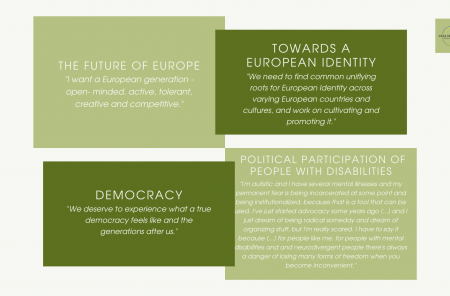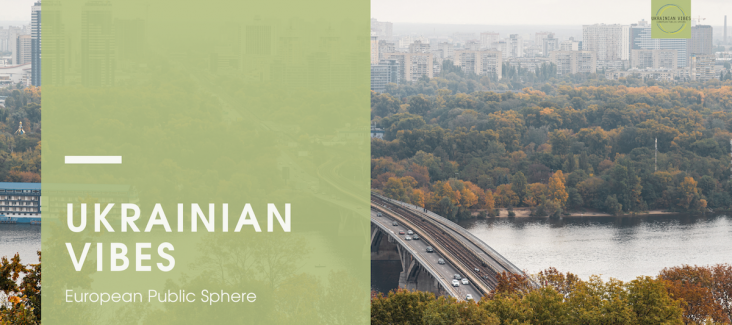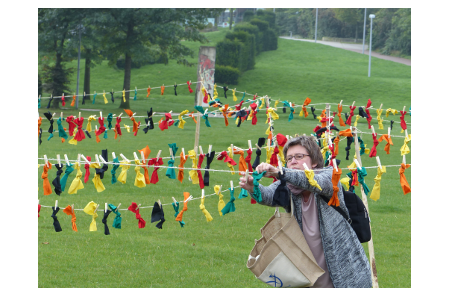Let’s have a look back on the project which was brought together by a team of German and Ukrainian volunteers who worked for Democracy International e.V., Change Communication, and the National Ecological Centre of Ukraine.
At the beginning of April 2021, the Ukrainian Vibes Team came together to organize the first leg of the tour. As the target audience were young Europeans from age 14 to 21, the project officially partnered up with the Junior Academy of Science of Ukraine. In June four workshops followed, in which participants interactively learned about political participation tools and ways to make Europe more sustainable. Supported by the knowledge of experts from the respective field of each online event, participants strengthened their ideas for the future of Europe and presented them in the last workshop session.
After the summer break, the tour continued. Three webinars on the topics Democracy, Sustainability, and European Integration were organised and took place in September. This time, the event’s structure shifted from an educational focus to an open dialogue between European citizens. In each webinar, participants were able to join a group and discuss a specific issue that relates to the topic. For example in the third and last webinar which was held under the topic “Europe & Ukraine” participants could join groups tackling the issues “Towards a European Identity”, “Ukraine en route to the EU: Citizens’ Opinions and Hopes” and “European Citizens from East and West”.
Due to the focus on Ukraine, many participants from the country joined the webinars. To gather as many ideas from voices all over Ukraine, this part of the tour was organised bilingual in Ukrainian and English language.
In every webinar, there were ideas regarding the future of Europe. Thinking about Europe’s sustainable future and especially smart cities and integrated city development, one participant stated “My hope for the future of Europe is that cities will not be developed only by the governments. Cities should be grown through creativity and participation of their citizens”. From the same webinar but this time regarding the topic of green tourism one stated “I wish for the future of Europe to experience more of the community-based tourism, initiatives, and possibilities to support local communities through responsible tourism practices”. By tackling not just broad issues but rather diving into specific areas, in the last webinar about Europe and Ukraine many voices were raised. Thinking about Ukraine and its EU integration process, a member of the Razumkov Center Ukraine stated a clear opinion on the next steps by saying “For the future: Overcoming internal problems, strengthening unity, a clear joint strategy in the Russian direction and a full-scale integration of Ukraine into the EU”. Regarding a stronger European identity, it was suggested that “there are bottom-up initiatives, and this is what youth can do and in general people who are interested in building Europe - the European civil society. It is a way of how ordinary people can benefit and contribute to a feeling of mutual benefit and enjoyment in Europe”. In general all participants agreed that “it is good to have the EU to keep a part of Europe together”. Nevertheless, the barriers between “Eastern” and “Western” European citizens were discussed too. “Talking about East and West it is a topic where you can find a lot of prejudices. We do not know very much about each other. We tend to build up stereotypes and we have fears and dreams about each other” explained a member of the Roskilde University, Denmark. The existing barrier between “Eastern” and “Western” European countries is seen as a result of many European countries in the East not being part of the EU. One participant stated “The eastern European countries who are not part of the EU are not considered partners in terms of geopolitical negotiations. The only question to them is: What do you bring to the table?”. Participants came up with approaches to bring Europe closer together by saying “You should start actually from where people are, instead of pushing something from the West to the East that they maybe do not need”. Supporting the approach of connecting on an eye to eye level another participant stated, “If you want to have cooperation it should be on an equal footage, everybody should be having some kind of benefit and that is something that is from my experience sometimes forgotten”.

Where does Europe begin and where does it end? - This was the question asked at the beginning of the project. What we can draw as a core message from the discussions is that for any further development of Europe we need to communicate properly with each other, we need to know each other, try to understand each other, and cooperate. This also seems to be the beginning of Europe, because communication is the foundation for the ideas on which our future is built. In all this, Europe should not forget about the potential of Europe’s rural areas. We should work on finding common unifying roots for European identity and need more consciousness for the fact that Europe does not end at the borders of the EU.
For our common future of Europe, we need to continue the pan-European dialogue and as citizens, we should use our power to spread the idea of an integrated, strong, just, peaceful, tolerant, stable, sustainable Europe - a Europe united in diversity.



